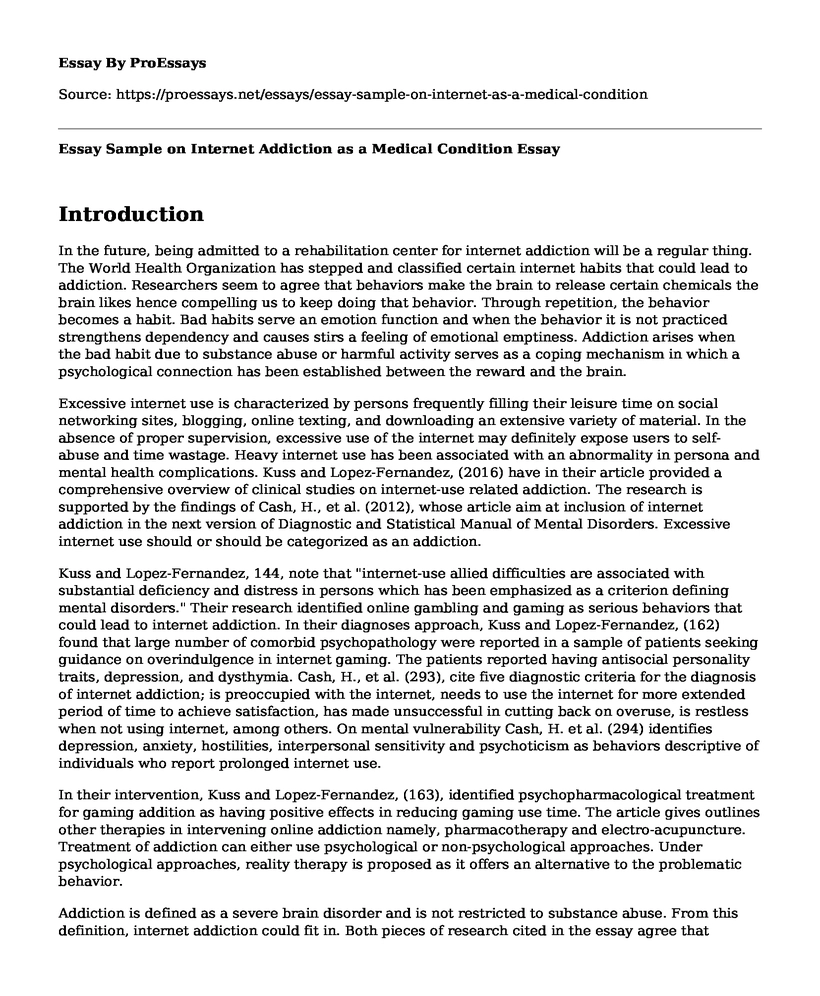Introduction
In the future, being admitted to a rehabilitation center for internet addiction will be a regular thing. The World Health Organization has stepped and classified certain internet habits that could lead to addiction. Researchers seem to agree that behaviors make the brain to release certain chemicals the brain likes hence compelling us to keep doing that behavior. Through repetition, the behavior becomes a habit. Bad habits serve an emotion function and when the behavior it is not practiced strengthens dependency and causes stirs a feeling of emotional emptiness. Addiction arises when the bad habit due to substance abuse or harmful activity serves as a coping mechanism in which a psychological connection has been established between the reward and the brain.
Excessive internet use is characterized by persons frequently filling their leisure time on social networking sites, blogging, online texting, and downloading an extensive variety of material. In the absence of proper supervision, excessive use of the internet may definitely expose users to self-abuse and time wastage. Heavy internet use has been associated with an abnormality in persona and mental health complications. Kuss and Lopez-Fernandez, (2016) have in their article provided a comprehensive overview of clinical studies on internet-use related addiction. The research is supported by the findings of Cash, H., et al. (2012), whose article aim at inclusion of internet addiction in the next version of Diagnostic and Statistical Manual of Mental Disorders. Excessive internet use should or should be categorized as an addiction.
Kuss and Lopez-Fernandez, 144, note that "internet-use allied difficulties are associated with substantial deficiency and distress in persons which has been emphasized as a criterion defining mental disorders." Their research identified online gambling and gaming as serious behaviors that could lead to internet addiction. In their diagnoses approach, Kuss and Lopez-Fernandez, (162) found that large number of comorbid psychopathology were reported in a sample of patients seeking guidance on overindulgence in internet gaming. The patients reported having antisocial personality traits, depression, and dysthymia. Cash, H., et al. (293), cite five diagnostic criteria for the diagnosis of internet addiction; is preoccupied with the internet, needs to use the internet for more extended period of time to achieve satisfaction, has made unsuccessful in cutting back on overuse, is restless when not using internet, among others. On mental vulnerability Cash, H. et al. (294) identifies depression, anxiety, hostilities, interpersonal sensitivity and psychoticism as behaviors descriptive of individuals who report prolonged internet use.
In their intervention, Kuss and Lopez-Fernandez, (163), identified psychopharmacological treatment for gaming addition as having positive effects in reducing gaming use time. The article gives outlines other therapies in intervening online addiction namely, pharmacotherapy and electro-acupuncture. Treatment of addiction can either use psychological or non-psychological approaches. Under psychological approaches, reality therapy is proposed as it offers an alternative to the problematic behavior.
Addiction is defined as a severe brain disorder and is not restricted to substance abuse. From this definition, internet addiction could fit in. Both pieces of research cited in the essay agree that disproportionate use of the internet should be classified as a medical condition. The symptoms identified by the authors in clinical practice overlap with symptoms in behavioral addiction. The researchers also identified diagnostic criteria for determining whether individuals using internet excessively are addicted or not. Moreover, they have outlined interventions and treatment of the condition. From the clinical approach taken by the researcher's excessive use of the internet should be classified as a medical condition.
Works Cited
Cash, H., et al. "Internet Addiction: A Brief Summary of Research and Practice." Current Psychiatry Reviews, vol. 8, no. 4, 2012, pp. 292-298, doi:10.2174/157340012803520513.
Kuss, D. J., and O. Lopez-Fernandez. "Internet addiction and problematic Internet use: A systematic review of clinical research." World Journal of Psychiatry, vol. 6, no. 1, 2016, p. 143, doi:10.5498/wjp.v6.i1.143.
Cite this page
Essay Sample on Internet Addiction as a Medical Condition. (2022, Dec 03). Retrieved from https://proessays.net/essays/essay-sample-on-internet-as-a-medical-condition
If you are the original author of this essay and no longer wish to have it published on the ProEssays website, please click below to request its removal:
- Celebrating the Strengths of Black Youth: Increasing Self-Esteem and Implications for Prevention
- Destigmatization of Mental Ailment Paper Example
- Essay Sample on Violence and Terror on the Southwest Border
- Essay Example on Carmen Maria Machado: Exploring Women's Cognitive Dysphoria
- Adolescence Mental Health: Prevention for Thriving Well-Being - Essay Sample
- Essay Sample on Black and Poor in USA: Barriers to Success
- Sexual Assault: Impact & Resources for Recovery - Essay Sample







